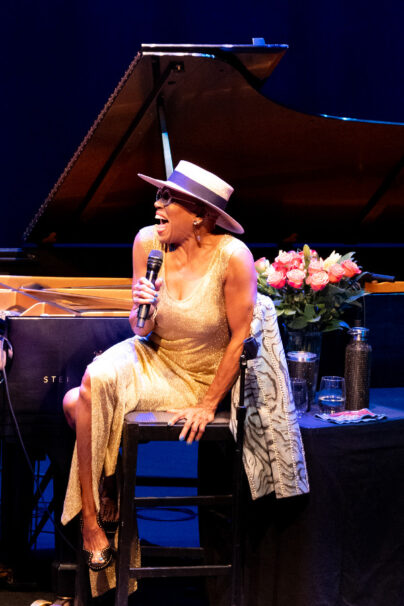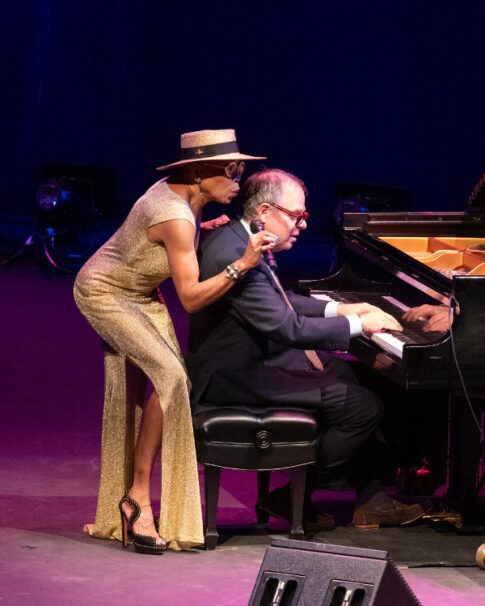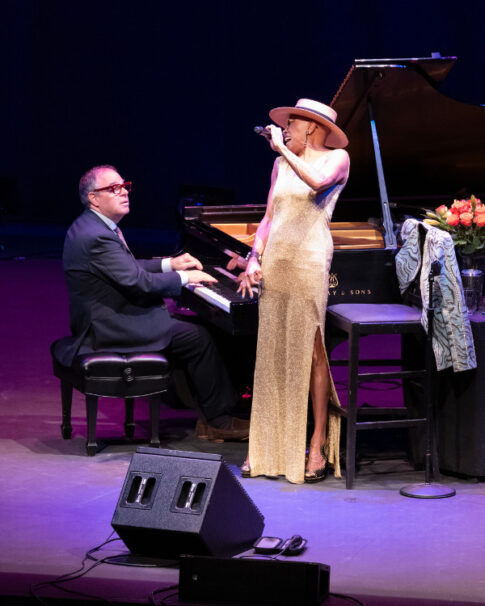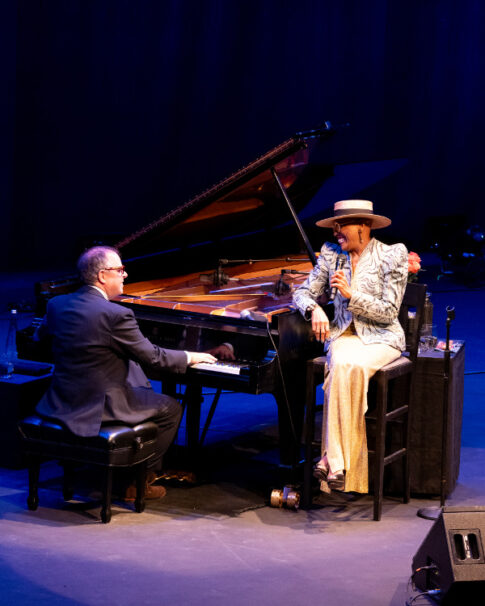
It was a provocative entry to a fall jazz season: singer Dee Dee Bridgewater and pianist Bill Charlap, performing in a duo format at Royce Hall for UCLA’s Center for the Art of Performance. Like a pro wrestling match between a pile-driving heel and a gymnast babyface, it was a potential mismatch too tantalizing to miss.
On paper, the two could hardly be more dissimilar. Bridgewater is one of the more extroverted jazz singers. Brash and brassy, she has a musical theater background (she was Glinda the Good Witch in “The Wiz”). If scat singing was a crime—as it often should be—Bridgewater would draw a life sentence. Singing like a horn, twisting and turning lyrics to suit her whims, and neglecting the meaning of a song have been some of her crimes. She’s unpredictable, and a Bridgewater concert can be like a day at the circus.


In contrast, pianist Charlap is one of the deeper of the elite jazz pianists with a firm connection to the Great American Songbook (his father was songwriter Morris ‘Moose’ Charlap and his mother is singer Sandy Stewart). Charlap’s a thoughtful player who can lead an attentive audience through jazz tunes and worthy standards, exposing seldom-heard harmonic and melodic possibilities. He can also make familiar material sound new.
Whatever else she is, Bridgewater enjoys a challenge. Last year she selected tap dance virtuoso Savion Glover for a series of intensive duo summits. This year, she’s briefly teaming with Charlap. At Royce, she perched at the treble end of the piano, close to Charlap. He rarely took his eyes off her, as though he didn’t really know where that ride would take them.
Though this was obviously not their first performance together, there were indications that their collaboration is still under construction. They chose material that every sentient jazz musician should know–Ellington, Fats Waller, the Gershwins and Cole Porter–nothing too far away from the fake books. In sunglasses and a low-crowned panama, Bridgewater wasn’t too long away from eye-to-eye contact with Charlap. No written music could be seen, and it appeared they were just calling tunes. She introduced the ballad “Here’s That Rainy Day,” in remembrance of a New York friend she recently lost. Her voice broke in the middle of the tune, and she walked behind Charlap, deep in her emotions. She stood for a time with her back to the audience, and after a moment to compose herself, Bridgewater returned to the front and continued.
Some singers serve the song, focusing on interpreting the lyrics, and telling the story contained therein. Bridgewater uses the song to dress her own caprices. She made a burlesque out of “Love For Sale,” singing in a little girl’s voice. And the brisk “Just One of Those Things” brought out her robo-scat: channeling Ella Fitzgerald’s “ee—eee-e-eee” that imitated the bowed solos of bassist Slam Stewart. The first bar of her improv didn’t vary appreciably than the last.

Typically, she sang the first chorus of a tune—staying faithful to the lyrics—and then launching into an improvisation. Charlap supported her, answered her phrases, and anticipated where she would go. Beyond the razzle dazzle and the too-hip mannerisms, he could catch her in the middle of a stream-of-consciousness scat line, and match her notes. Or, as she dipped into an impressive upper contralto strata on “Mood Indigo,” the piano discreetly quoted Gershwin’s “Prelude No. 2.” They were particularly playful on “In the Still of The Night,” where she unsheathed a strong soprano for a soaring line, and then she put it away–one of the happy accidents nestled into almost every tune.
Ultimately, Charlap’s musical rectitude and cunning empathy reigned in some of Bridgewater’s more untethered flights. She, in turn, evinced a jocular side to his playing that few of his fans have heard. And while Charlap and Bridgewater may have missed a full musical embrace, the Royce concert was a more-than-respectable handshake.
photo credit: jason williams

This is certainly not a warm and fuzzy, “feel good” Facebook recap. Kirk tells it like he sees it, giving us the true impact of the evening. He always writes with depth.